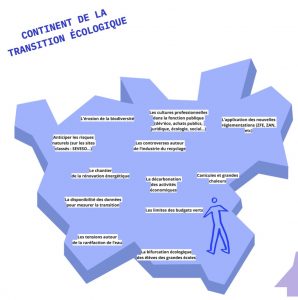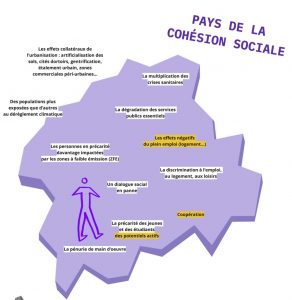Rebonds is on! Our investigation began with the most exhaustive possible identification of the problems experienced on the ground by the territories associated with Rebonds (Grenoble, Nantes, Bordeaux, Puisay Forterre…but also our partners France Urbaine, Intercommunalités de France, Ademe, etc.), at the crossroads between economic development, ecological transition and social justice.
We have chosen to take as our model what are now known as “wicked problems”. What’s it all about? In society, there are simple problems – the elements needed to solve them are known or accessible – complicated problems – for example, going to the moon – and there are problems that are “sneaky”, like the ecological transition or pension reform. A complex problem isn’t easy to solve, but those who have to do it are more or less in agreement on the solutions, and are moving in the same direction.
The insidious problem, on the other hand, is characterized by a lack of consensus on the very definition of the problem. In the absence of an agreed definition, it is illusory to hope for a solution. As Claude A. Garcia and Silvio O. Funtowicz explain in this article for Le Monde, “while other problems call for solutions, insidious problems require deliberative processes”. In reality, these insidious problems call for the mobilization of unprecedented systemic, multi-disciplinary and experimental approaches, well described by sociologist Isabelle Arpin in this free issue of the “le virus de la recherche” collection.
So what are the simple, complex or insidious problems experienced in our territories when it comes to linking economic development, ecological transition and social justice? During the first Rebonds session, we listed over fifty of them, which can be viewed below and on this miro. Make up your own mind, distinguish between those that seem simple, complex or sneaky, prioritize those that seem most prevalent in your area, or suggest new ones!

Financing the ecological and social transition
> Taxation and transition against a backdrop of falling government subsidies
> Tax evasion and transition (cost of tax evasion 80 billion/year)
Waste as a new resource?
The difficulty for local authorities to mobilize VSEs/SMEs
Corruption
Negotiated urban planning
The end of the metropolitan model
Platformization of urban services, Amazon vs. local commerce
> Regulation of digital platforms: AirBNB, Dark Kitchens, etc.
Lack of representation of economic development players, patriarchy in the economy
Taking the informal economy into account
> The underground economy accounts for 12% of GDP, or 2.5 million people in France, mainly in the hotel and catering, food retail, construction, security and transport sectors.
> Territorial contributory income, ecological transition income (Zoein)
Difficulty in assessing the impact of economic development policies, in accessing reliable data
Mobile (and essential) workers
The return of handiwork and craftsmanship
More economic action, less development?
The challenge of recycling wasteland (ZAN)
Few elected officials and citizens trained in public policy issues
The resource crisis
> Tensions over water scarcity (e.g. megabassines in Charente in agriculture, STMicro in industry in Grenoble, creation of new EPRs, etc.).
> Standards that do not follow experimentation to make them effective
> Initiatives to change our relationship with water resources (Parlement de Loire, l’Appel du Rhone, Les gardiennes de l’eau à la MEL, legal personality for rivers, bioregionalism)
The limits of eco-conditionality (little effect in the end)
The changing relationship with work (value, meaning)
Administration in silos, new public management
Over-frequentation, demarketing
> Slowtourism: marketing to enhance residential appeal
> Decline in international convention business (collective experiments with members of the Nantes St-Nazaire Convention Bureau)
> Re-directing mountain regions
> Attracting too many students is no longer seen as an asset
Contested site plans
> Ex: STMicro in Grenoble, massive subsidies to recycling companies
> E.g.: contested airport expansions
> Hydrocarbon pollution since 10 by Béton Lyonnais, Controversies surrounding the Vallée de la Chimie in the Lyon area, Opposition to the XXL methaniseur south of Nantes
> Construction of a 10,000m2 warehouse on arable land in the Lille metropolitan area (Médiacités)
> Use of gypsum to improve housing insulation (quarry project abandoned in Maurienne)
Too many calls for projects
The inadequacy of urban economic models for sobriety
The commodification of intangible goods

Erosion of biodiversity
The professional cultures of economic development in the light of transition
> The transformation of the developer’s profession (e.g. MEL launched its transformation contract in April 2023)
Application of new regulations (ZAN, ZFE, etc.)
Controversies surrounding the recycling industry
> The dead ends of the recycling economy (20% of plastics actually recycled by 2050 (International Energy Agency, quoted by Flore Berlingen).
> The failure of the polluter-pays principle and ecological compensation: the example of the EPR “household packaging” sector, where the annual tonnage of packaging has increased by 20% in 30 years (source: “Permis de nuire”, by Flore Berlingen).
Consequences of climate change on Seveso sites
> Eqiom cement plant in Lumbres, Pas de Calais (1,300 Seveso sites in France)
The scale of the energy renovation project
> E.g.: 39,000 partial renovations for 500,000 thermal flats in the Hauts de France region (source Médiacités).
> Ex: 250,000 additional jobs to be created by 2030 (France Stratégie study)
> Example: failure of the SEM “Croissance verte” in Pays de la Loire
An increase in heatwaves and heat waves
> Ex: Hardship: Professions in the green economy (e.g. waste recycling) are now associated with higher exposure to hardship factors than others (Dares 2023 study).
Decarbonizing economic activities
Lack of data to measure transition
The limits of green budgets
The ecological bifurcation of high school students
Transition in the face of green-washing, conspiracy theorists, climate skeptics, anti-wokers…

The collateral effects of urbanization: soil artificialisation, dormitory towns, gentrification, urban sprawl, peri-urban commercial zones, etc.
> E.g.: 2,500 hectares of natural and agricultural land transformed into urban zones in Nantes in 25 years (source Médiacités).
Vulnerability to climate change
> Ex: 50% of the population and jobs threatened by flooding in Lille (Médiacités)
Populations more exposed than others to climate disruption: people in precarious situations more affected by EPZs
> 10% of households in poverty in Nantes, and between 50 and 60% in priority neighborhoods (source: City of Nantes)
> Ex: In Seine-Saint-Denis, three out of four cars will be off the road by 2024 (source Reporterre)
A growing number of health crises
Degradation of essential public services
> Ex: In 40 years, the quality of essential public services has deteriorated: emergency services, hospitals, schools, maternity wards, etc. (Nos Services Publics 2023 report).
> E.g.: shortage of applicants in essential public services: nurses, nursing managers and nursery nurses, hospital service staff, town hall secretaries, social workers, technical staff, cooks and accountants, 3,100 vacant teaching posts by 2023 (Nos Services Publics 2023 report).
The negative effects of full employment (e.g. housing)
Discrimination in employment, housing and leisure activities
> The feeling of discrimination has risen from 14% to 18%, driven by women and the sexist motive (Insee data).
> 91% of black people in mainland France say they are victims of racial discrimination in their daily lives (Ipsos 2023 survey)
Social dialogue on the rocks
The precarious situation of young people, students and many working people
The labor shortage
lack of cooperation
